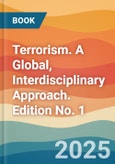An engaging and comprehensive introduction to the quantitative study of terrorism, perfect for undergraduate students approaching the subject for the first time
Terrorism: A Global Introduction provides a balanced and timely overview of the multi-disciplinary field of Terrorism Studies. Covering all the major theoretical and empirical approaches to understanding terrorism, this accessible textbook discusses contemporary terrorism research, highlights emerging issues in terrorism, explains the disciplinary origin of key theories and concepts, and more. Student-friendly chapters, written by a panel of experts in the field, distill complex concepts in the study of terrorism into easy-to-digest material with numerous illustrative examples and vignettes drawn from current and well-known historical events.
Organized into four parts, the textbook begins by contextualizing terrorism as a distinct phenomenon, addressing its fundamental concepts and historical background, the primary ideologies associated with modern terrorism, and the geographical characteristics of terrorism from 1970 to the present. The second part describes the wide range of theories that seek to explain the origins of terrorism and radicalization at the individual, group, and system levels. Part III delves into the organizational characteristics of terrorist groups, their strategies, and their operational tactics. The fourth part focuses on the many consequences of terrorism and a variety of approaches to countering an active terrorist threat and preventing violent extremism. A unique textbook in the field, Terrorism: A Global Introduction: - Employs an interdisciplinary approach that spans the social sciences, allowing instructors to highlight the theories relevant to students in different majors - Combines empirical analysis of how terrorism has evolved with theoretical explanations of how individuals become terrorists and how groups adopt terrorism - Highlights emerging issues in the study of terrorism, such as alliances between organized crime and terrorist organizations and the impacts of new information technologies - Includes access to a companion website with an Instructor's Manual, sample syllabi, a test bank, supplemental readings, exercises, multimedia and interactive materials, study guides, and links to cutting-edge research, data, and tools
Terrorism: A Global Introduction is the ideal textbook for terrorism-related undergraduate courses in political science, criminology, sociology, anthropology, psychology, international relations, history, and other social sciences.
Terrorism: A Global Introduction provides a balanced and timely overview of the multi-disciplinary field of Terrorism Studies. Covering all the major theoretical and empirical approaches to understanding terrorism, this accessible textbook discusses contemporary terrorism research, highlights emerging issues in terrorism, explains the disciplinary origin of key theories and concepts, and more. Student-friendly chapters, written by a panel of experts in the field, distill complex concepts in the study of terrorism into easy-to-digest material with numerous illustrative examples and vignettes drawn from current and well-known historical events.
Organized into four parts, the textbook begins by contextualizing terrorism as a distinct phenomenon, addressing its fundamental concepts and historical background, the primary ideologies associated with modern terrorism, and the geographical characteristics of terrorism from 1970 to the present. The second part describes the wide range of theories that seek to explain the origins of terrorism and radicalization at the individual, group, and system levels. Part III delves into the organizational characteristics of terrorist groups, their strategies, and their operational tactics. The fourth part focuses on the many consequences of terrorism and a variety of approaches to countering an active terrorist threat and preventing violent extremism. A unique textbook in the field, Terrorism: A Global Introduction: - Employs an interdisciplinary approach that spans the social sciences, allowing instructors to highlight the theories relevant to students in different majors - Combines empirical analysis of how terrorism has evolved with theoretical explanations of how individuals become terrorists and how groups adopt terrorism - Highlights emerging issues in the study of terrorism, such as alliances between organized crime and terrorist organizations and the impacts of new information technologies - Includes access to a companion website with an Instructor's Manual, sample syllabi, a test bank, supplemental readings, exercises, multimedia and interactive materials, study guides, and links to cutting-edge research, data, and tools
Terrorism: A Global Introduction is the ideal textbook for terrorism-related undergraduate courses in political science, criminology, sociology, anthropology, psychology, international relations, history, and other social sciences.








